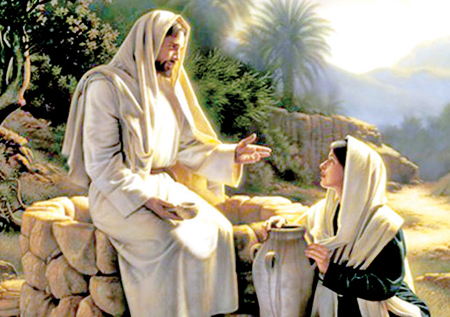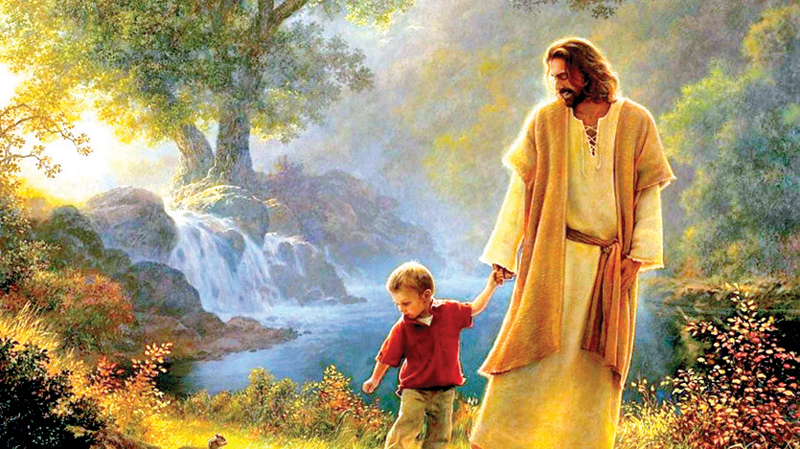 “Today in the town of David a Saviour has been born to you; he is the Messiah, the Lord. This will be a sign to you: You will find a baby wrapped in clothes and lying in a manger.” (Luke 2:11-14)
“Today in the town of David a Saviour has been born to you; he is the Messiah, the Lord. This will be a sign to you: You will find a baby wrapped in clothes and lying in a manger.” (Luke 2:11-14)
All those years ago, a baby was born in Bethlehem – a baby whose name will be on everyone’s lips, even 2,000 years later. He was none other than Jesus, Son of God and Messenger of Peace. His vision, his words still ring true today and people still seek solace in his embrace.
It’s that time of the year again. Christians around the world including those in Sri Lanka will celebrate Christmas, which marks the birth of the Son of God Jesus Christ, on December 25. It is a joyous event that celebrates the eventful life of Jesus, whose words still ring true today, more than 2,000 years on.
Christmas has now become a worldwide celebration that transcends communal and religious boundaries. True, it has become commercialised to the extent that some children apparently believe they are celebrating the birthday of Santa Claus. But if one looks beyond the baubles and glitter, Christmas is still a celebration of his story, a story that profoundly changed the history of mankind.
Jesus
Christmas is all about giving – forgiving too. It is about sharing what you have with others who are less fortunate. Jesus himself was not born with a silver spoon in his mouth. He was born in a manger in a common man’s cottage in Bethlehem. “This is how God showed his love among us: He sent his one and only Son into the world that we might live through him”. (John 4:9)
Christmas is a joyous occasion – there is nothing wrong in celebrating it in a materialistic way, but we must also be mindful of the spiritual importance of the day. Listening to the Christmas day sermon is not good enough – one has to follow those tenets. This goes for all religions. In fact, many experts say that today’s society has become violent and crime-ridden, because people have moved away from religion and moral values. This is why it is important for temples, kovils, churches and mosques to get closer to their followers and congregations. The religious leaders must proactively spread the message of peace and non-violence. “If it is possible, as far as it depends on you, live at peace with everyone.” (Romans 12:18)
This is essential for Sri Lanka, which is seeking lasting peace and reconciliation after three decades of discord. It is not an overnight process. Religious dignitaries and the faithful can play a bigger role in achieving reconciliation in our land. Coming to terms with the past is an essential component of this exercise. “Bear with each other and forgive one another if any of you has a grievance against someone. Forgive as the Lord forgave you.” (Colossians 3:13-14)
It is only through such a healing process that we can achieve lasting peace for all. Appropriately, the Government plans to appoint a Truth and Reconciliation Commission for this purpose. In this context, we can seek solace in the core message of Jesus Christ – and Christmas – which has unchanged for centuries. His message is relevant today as it was 2000 years ago – “Peace I leave with you; my peace I give to you”. (John 14:17)
 But peace must begin from within our hearts. Shedding evil thoughts from our minds and seeing inner beauty is essential if we are to lead pious lives. We accumulate evil thoughts including jealousy, hatred and envy in the relentless pursuit of money and material gains. We engage in sin, contravening the teachings of the Great Masters including Jesus Christ. “Whoever conceals their sins does not prosper, but the one who confesses and renounces them finds mercy”. (Proverbs 28:13).
But peace must begin from within our hearts. Shedding evil thoughts from our minds and seeing inner beauty is essential if we are to lead pious lives. We accumulate evil thoughts including jealousy, hatred and envy in the relentless pursuit of money and material gains. We engage in sin, contravening the teachings of the Great Masters including Jesus Christ. “Whoever conceals their sins does not prosper, but the one who confesses and renounces them finds mercy”. (Proverbs 28:13).
This Christmas should be a day for contemplating on the never-ending ‘rat race’ of life and guiding our lives in a new direction, sans wrongdoings and sins. Peace and compassion shall begin in our hearts and homes and then spread outwards. Parents have a special responsibility to ensure that their children grow up adhering to cherished religious tenets and moral values.
It is His birthday that we celebrate . A birthday of a great man who had a great message. Today, this occasion is called Christmas in English. It is a day on which one gives – and forgives – in equal measure. It is a day of unbridled joy that brings everyone together, regardless of race and religion. “But let all those that put their trust in thee rejoice: let them ever shout for joy, because thou defendest them: let them also that love thy name be joyful in thee.” Psalms 5:11
Sharing
Sharing is an essential part of Christmas. It is a time to share not only food and drink, but also your time with others who are less fortunate than you are. This is the very essence of Christmas, which has been celebrated since the days of the Roman Empire. However, it is only much later that elements of commercialism crept into Christmas festivities.
Today, the very message of Christmas has been lost in a torrent of commercialism. From Santas in shopping malls to artificial snow in the tropical heat, the observance of Christmas has veered away from its spiritual angle. Everyone wants to cash in on the Christmas season. But then, these traditions have become so ingrained in Christmas culture that we cannot imagine a Christmas without them.
Santa Claus
Christmas is not complete without this jolly old fellow going around the world in a sled pulled by Rudolph the reindeer and the team. In his sack, he has gifts for all good children in the world. The legend of Santa Claus can be traced back hundreds of years to a monk named St. Nicholas.
It is believed that Nicholas was born sometime around 280 A.D. in Patara, near Myra in modern-day Turkey. Much admired for his piety and kindness, St. Nicholas became the subject of many legends. It is said that he gave away all of his inherited wealth and travelled the countryside helping the poor and the sick. The name Santa Claus evolved from Nick’s Dutch nickname, Sinter Klaas, a shortened form of Sint Nikolaas (Dutch for Saint Nicholas).
In 1822, Clement Clarke Moore wrote a long Christmas poem for his three daughters entitled “An Account of a visit from St. Nicholas.” Moore’s poem is largely responsible for our modern image of Santa Claus as a “right jolly old elf” with a portly figure. Cartoonist Thomas Nast created the first likeness that matches our modern image of Santa Claus in 1881. His cartoon, which appeared in Harper’s Weekly, depicted Santa as a rotund, cheerful man with a full, white beard, holding a sack laden with toys for lucky children. It is Nast who gave Santa his bright red suit trimmed with white fur, North Pole workshop, elves, and his wife, Mrs. Claus.
The other main tradition associated with Christmas, the Christmas Tree, has an equally long history. The evergreen fir tree has traditionally been used to celebrate winter festivals for thousands of years. Pagans used branches of it to decorate their homes during the winter solstice, as it made them think of the spring to come. Germany is credited with starting the Christmas tree tradition as we now know it in the 16th century when devout Christians brought decorated trees into their homes. Some built Christmas pyramids of wood and decorated them with evergreens and candles if wood was scarce. It is a widely held belief that Martin Luther, the 16th-century Protestant reformer, first added lighted candles to a tree. In 1846, the popular royals, Queen Victoria and her German Prince, Albert, were sketched in the Illustrated London News standing with their children around a Christmas tree. The Christmas Tree had well and truly arrived.
Celebration
Christmas brings “joy to the world”, so it is only natural that everyone is drawn to the materialistic side of Christmas. But the spiritual side of this celebration must not be forgotten. “For God so loved the world that he gave his one and only Son, that whoever believes in him shall not perish but have eternal life.” John 3:16.
Just going to the Church will not do – one has to listen intently and follow through with the appropriate tenets. Christmas is all about living a good life – but not on your own or for you alone. Share your joy with the world and the world shall return the favour. “Delight yourself also in the Lord: and he shall give you the desires of your heart.” Psalms 37:4
Christmas is not only about the birth of a Great Man, but also about celebrating his enduring legacy in a world torn apart by conflict, as seen in Russia-Ukraine and Israel-Gaza. It is time to take his words to heart to make our world a better, peaceful place. “For I know the plans I have for you – plans to prosper you, plans to give you hope and a future.” (Jeremiah 29:11)




